
8 Feb, 2024
Geopolitics shunts sustainability as the biggest threat to Travel & Tourism
Bangkok — Thailand’s foreign policy of maintaining strict neutrality in the midst of superpower bunfights has become the key to its national security and economic survival. Although Travel & Tourism is both a major component and beneficiary of that policy, the prospect of prolonged global geopolitical instability means that industry is hanging by a thread, over-exposed to external shocks and biding time until the next one.
That was the most important takeaway from a high-level forum on “Geopolitics – Seeking Opportunities for Thailand in the Midst of Crises” organised by Krungthep Thurakit (Bangkok Business), a publication of The Nation Group on 31 Jan. Speakers from government agencies, banks, private companies and the military all agreed that Thailand would have to tap its core fundamentals such as geographical location, qualified work-force and good infrastructure, amongst others, to continue to attract investment, maintain tourism and two-way trade worldwide.
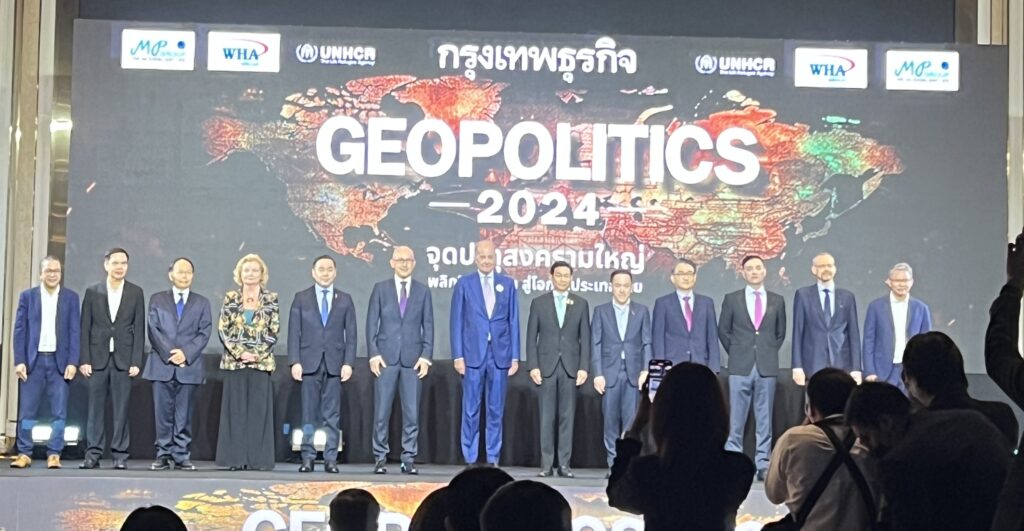
A closer study of the presentations and statements showed that just one year after the Covid crisis, the next crisis is already here. The most dangerous difference is that the pandemic of conflicts is spreading with no preventive measures or vaccines in sight. In fact, the scenario looks bleak, with mid-sized countries such as Thailand facing severely restricted decision-making policy space in the face of a breakdown in the global rule of law and uncontrollable external shocks.
Here are my key takeaways from the conference:
1. Media groups organising events are recognising that the impact of geopolitics can no longer be swept under the carpet. This was the second year that Krungthep Thurakij had organised an event based on the same theme. The publication’s editor Mr Weerasak Pongsakorn said economic issues could no longer be treated in isolation and the media now had a professional responsibility to analyse the impact of geopolitics on future economic prospects.
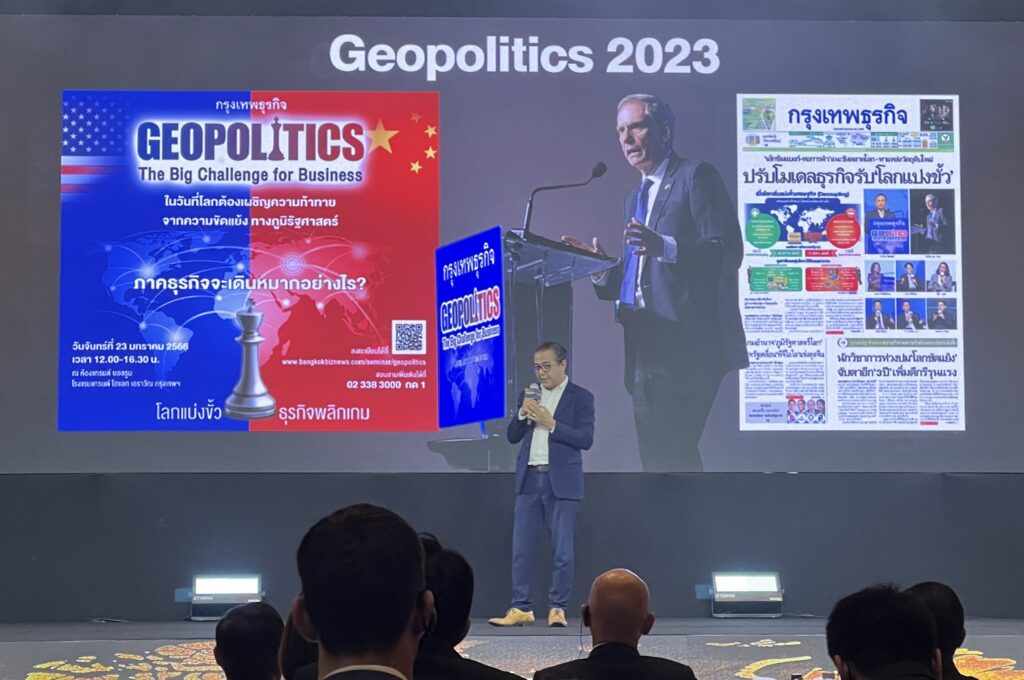
2. Thai Foreign Minister and Deputy Prime Minister Parnpree Bahiddha-nukara covered three subjects in his keynote speech: 1) Geopolitical challenges facing Thailand; 2) Adaptation and Opportunities for Thailand; 3) Diplomatic directions.
He began by citing the theme of the January 2024 World Economic Forum “Rebuilding Trust Amid Uncertainty” and the lack of trust amongst the global superpowers as one of the contributing factors to geopolitical instability. This was exacerbating other existing challenges such as the climate change and Artificial Intelligence. Thai foreign policy would remain neutral but have to adapt and adjust accordingly.
He pointed to the recent meeting in Bangkok between the Chinese Foreign Minister and the UN National Security Advisor Jake Sullivan as an example of how both superpowers respected the Thai stand. Economic Diplomacy is now a main driver, with initiatives such as the outreach to the tech giants to invest in Thailand, more free-trade agreements, the land-bridge project and the visa-free agreement with China, with more to follow to attract digital nomads and high-skilled personnel.
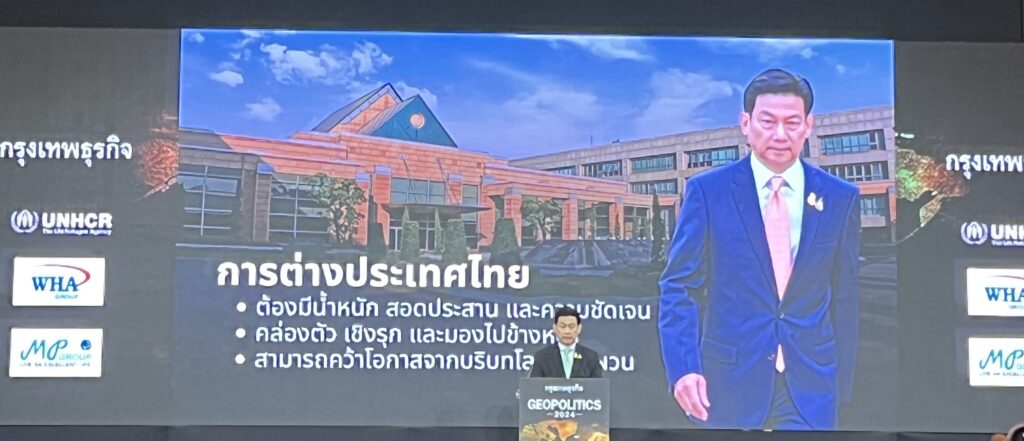
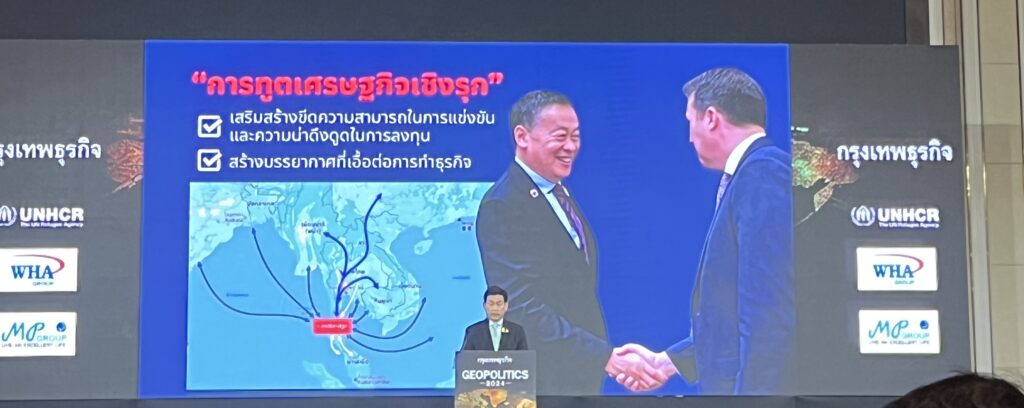
In terms of Diplomatic Directions, Mr Parnpree flagged the role of “robust, proactive diplomacy” to strengthen relations with ASEAN and build seamless connectivity with other subregional groupings such as BIMSTEC and IMT-GT. Sorting out the problem with Myanmar would be critical on the basis of the ASEAN Five-Point Consensus, and initiating an internal dialogue process within Myanmar itself. He said Thailand’s candidature for a seat on the UN Human Rights Council for the period 2025-2027 was motivated by the desire to build trust and enhance Thailand’s competitiveness based on the rule of law and respect for sovereignty, democracy, human rights and peaceful settlement of disputes under the framework of sustainable development.
3. The head of the UN High Commission for Refugees Mr Giuseppe de Vincentiis talked about the human consequences of geopolitical conflicts as well as natural disasters and climate change. Referring to the refugee crisis as a “thermometer” of the global scenario, Mr De Vincentiis noted that the number of forcibly displaced refugees has grown from 17.1 million people in 2003 to 114 million in 2023, across all continents, mostly in the low and middle income countries. Stating that the UNHCR is being called to respond to a new crisis literally every 10 days, he appealed to the delegates to see these as not as “dry statistics” but as human beings, mostly women and children.
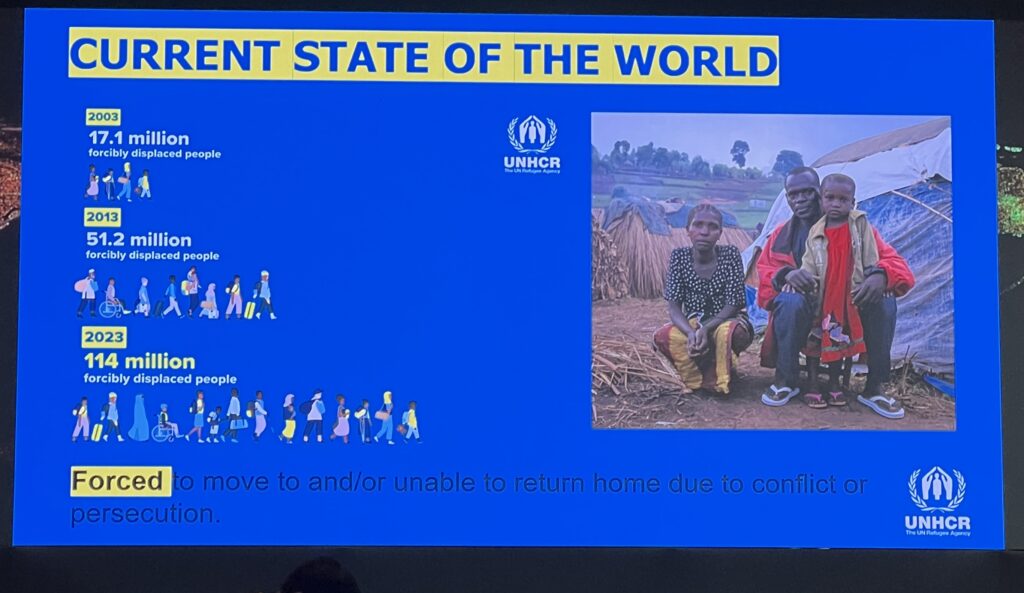
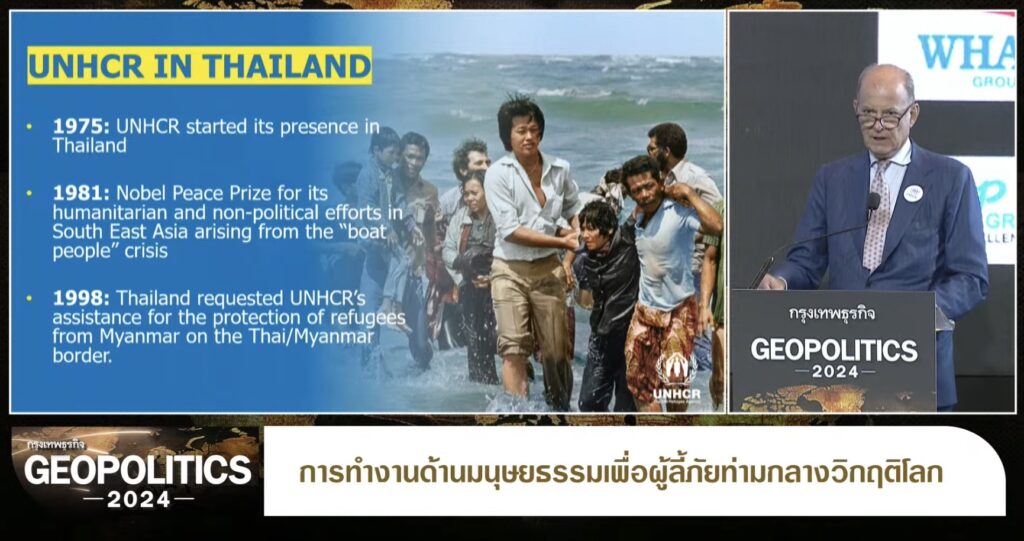
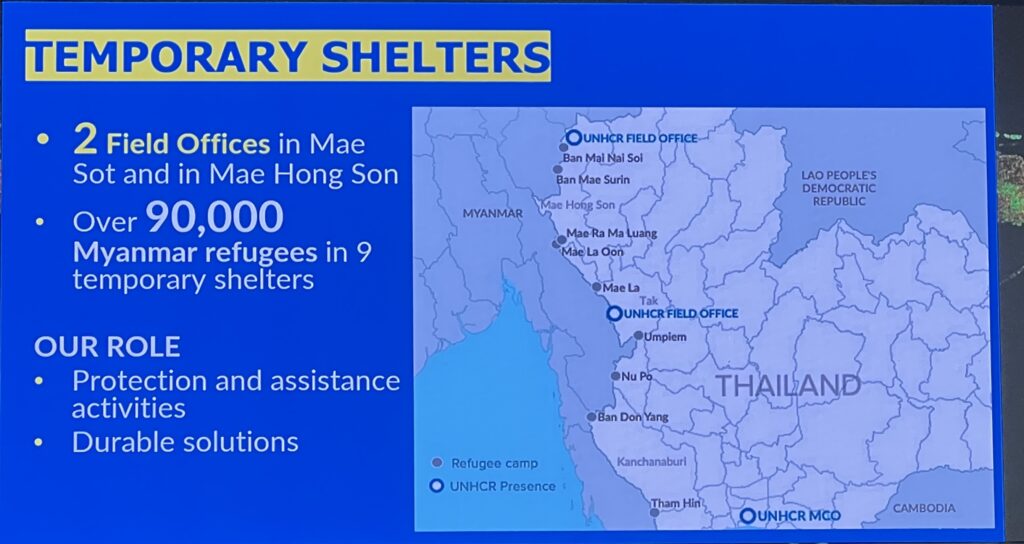
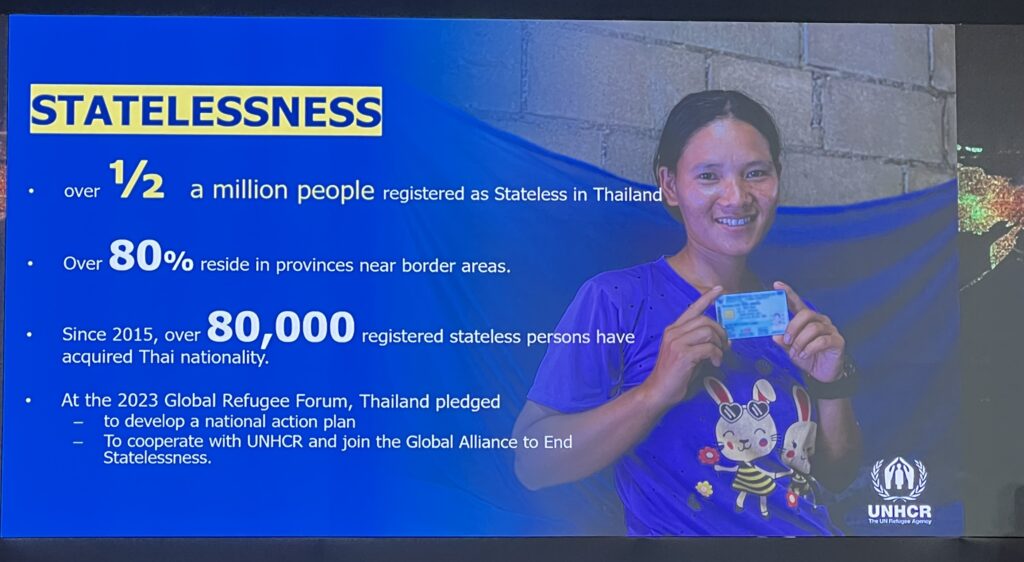
He highlighted Thailand’s experience in dealing with the refugees, and praised its humanitarian approach, starting with the boat people fleeing the Indochina wars and the Cambodian refugees fleeing the genocidal Pol Pot regime in the 1970s. Today, he said, Thailand has more than 90,000 Myanmar refugees in nine temporary shelters along the border. In addition, there are more than 500,000 people registered as stateless, with over 80% reside in provinces near border areas. He lauded the Thai government for giving nationality to more than 80,000 registered stateless persons since 2015. However, he feared that as the conflict in Myanmar escalates, more refugees can be expected to flood the border areas.
Mr de Vincentiis also highlighted the long, complicated process of resettling or repatriating the refugees, the enormous expense and effort that goes into providing them with shelter and food. Either way, he said, these are only temporary solutions which need to be maintained until the more challenging political solutions can be reached by addressing their root causes. With donations falling short, the scale of the crises is overwhelming the capacity of the UNHCR to respond. He noted that donor patterns are also changing, with more funds now coming from the private sector rather than the government agencies.
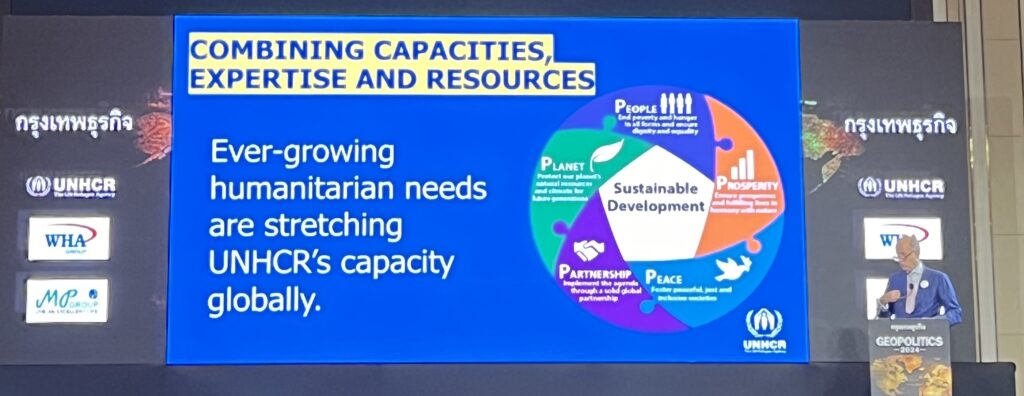
4. Maj Gen Niphat Thonglek, Advisor to the Prime Minister and former Permanent Secretary of the Ministry of Defence, provided rich insights into the military thinking that drives global geopolitical conflicts. Discussing the source of US military domination, he said the US military had divided the world into 7 commands which were backed by 18 intelligence gathering centres, all of which are designed to safeguard and advance US interests via a combination of military, political and economic means. Thailand comes under the command based in Hawaii. A new Space Command has also been created to oversee warfare in space.
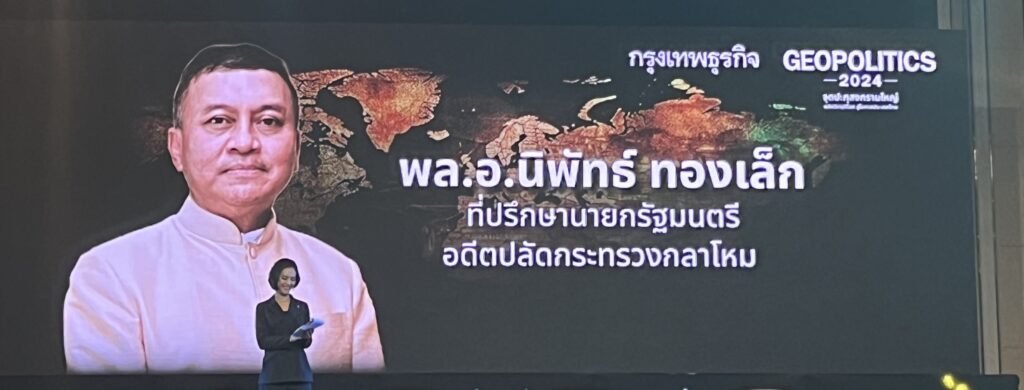
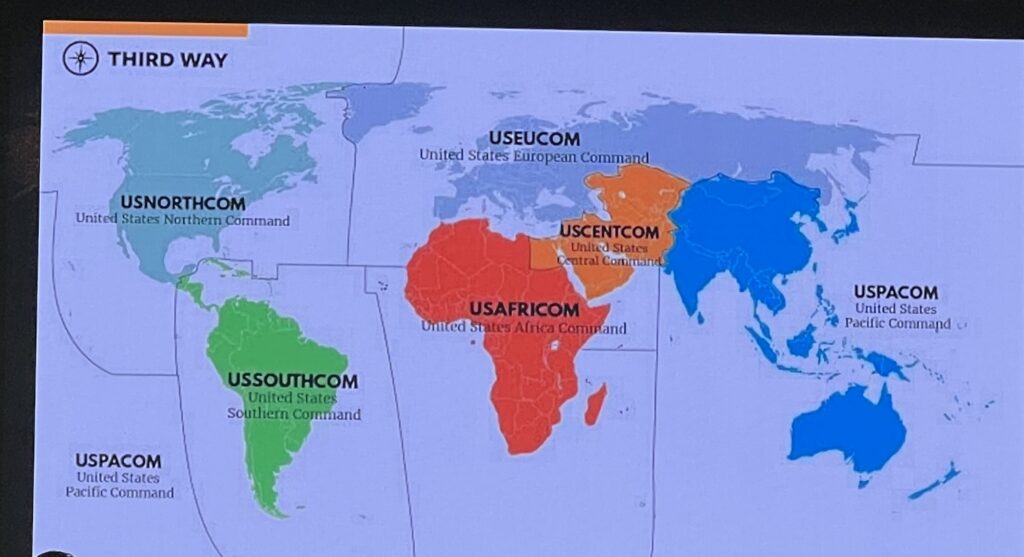
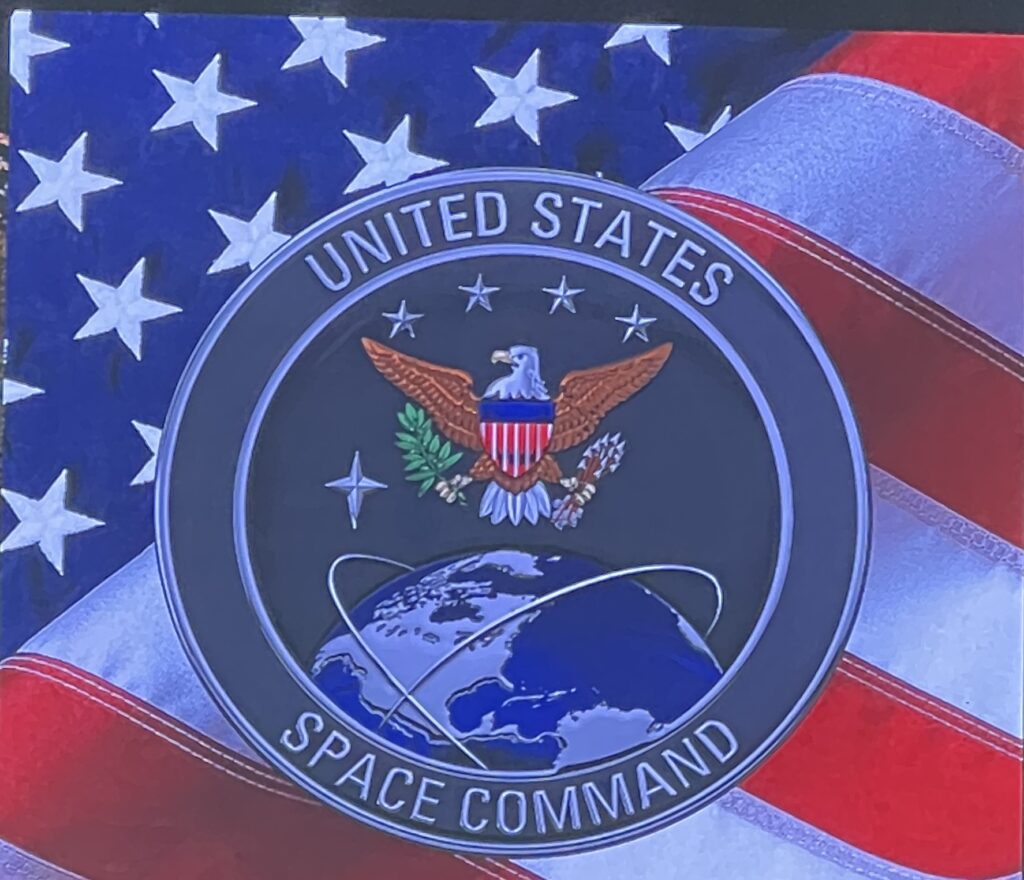
He said all wars have one or all four objectives, which he described as the three F’s and one L (food, fresh water, fuel [energy] and land). Implying that US power controlled the entire world, he said he knew exactly how the Ukraine and Middle East conflicts would end — with the territories of the conflicting parties being divided up, like East and West Germany after World War II, the two Koreas after the Korean wars and North & South Vietnam. He also said the Myanmar military is weakening and coming under more attacks, as the people rise up against dictatorships and the tribal areas step up their attacks against the junta.
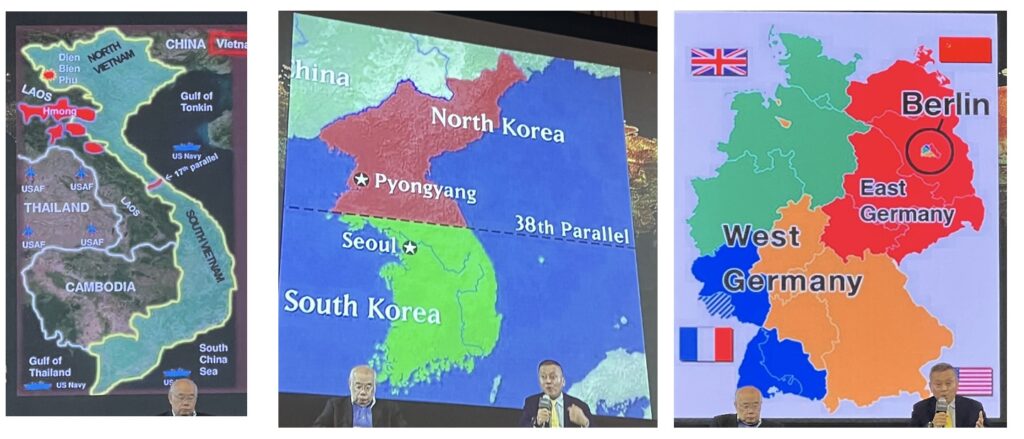
Where is the opportunity for Thailand in these crises? Maj Gen Niphat said the conflicts were creating thousands of injured victims who had lost their limbs. Thailand should consider the business and economic potential of becoming a hub for manufacturing of prosthetics.
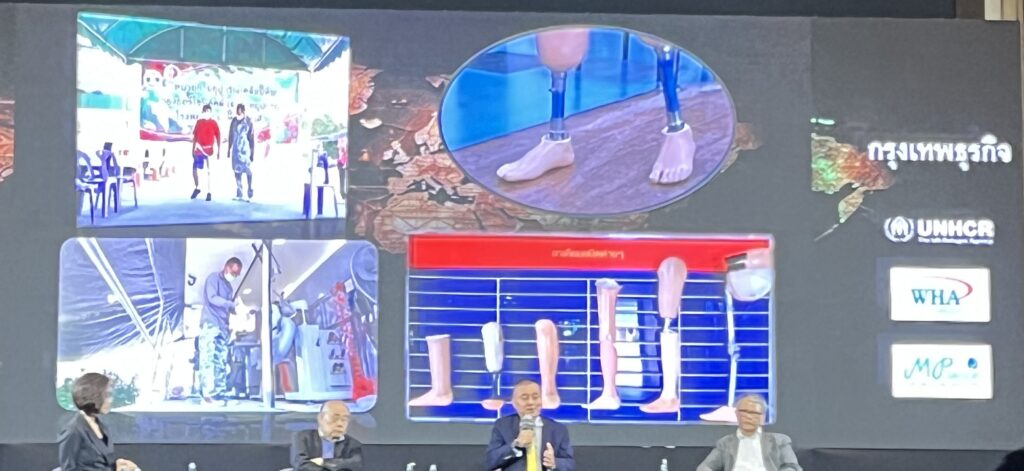
5. Ms. Jareeporn Jarukornsakul, Chairman of Board of Directors, WHA Corporation, cited the impact of the China-US trade wars and how Thailand (along with other countries such as India and Vietnam) was benefitting from the relocation of manufacturing centres out of China. Thailand’s four contributing factors, she said, were its neutral political stance, attractive investment incentives, supportive government policies and competitive labour pool. In addition, Thailand had reliable utility and power supply facilities, infrastructure connectivity and and an integrated supply chain system. All relocating companies would need land, and demand for that had seen land sales hit an all time high.
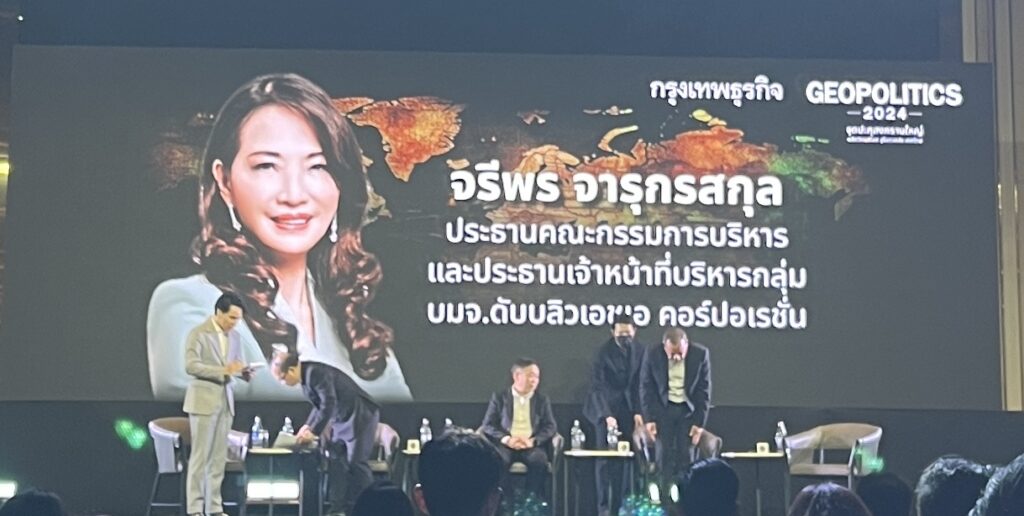
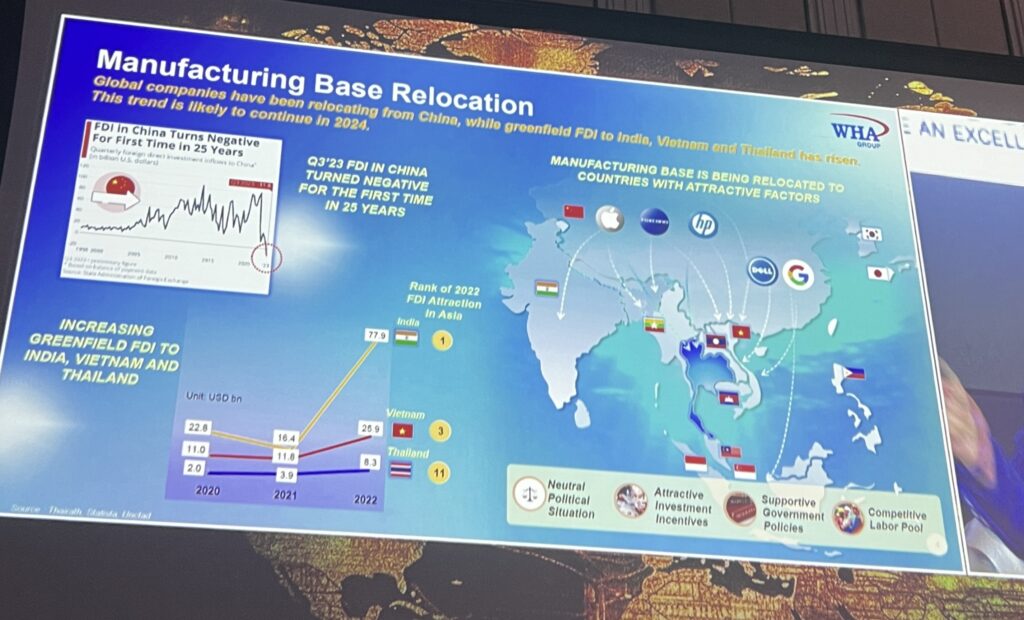
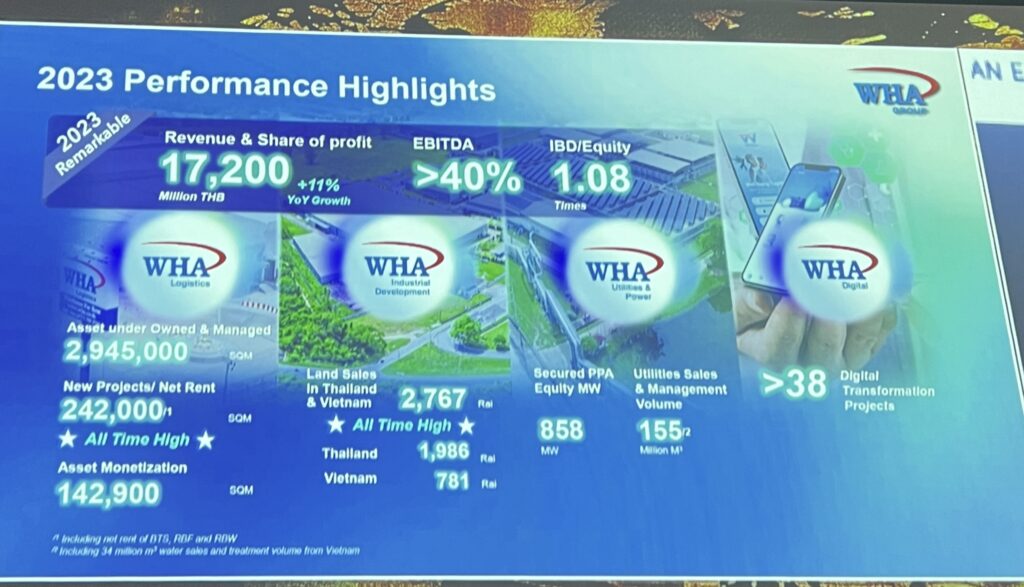
6. The final speaker Dr Chainan Charoensuk, Chairman of the Thai National Shippers Council, discussed the impact on the shipping lanes as a result of the conflicts in the Red Sea. Noting that freight costs had risen by 4-5 times, he called for a complete restructuring and rebalancing of the Thai economy with a focus on more trade with the Global South and reduced dependence on the industrialised countries. He said Thailand had to move towards deglobalisation, decoupling and de-risking to reduce exposure to external shocks. Thailand had experienced many crises in the past, as had other countries, but the difference was that Thailand was able to adapt and adjust quickly.
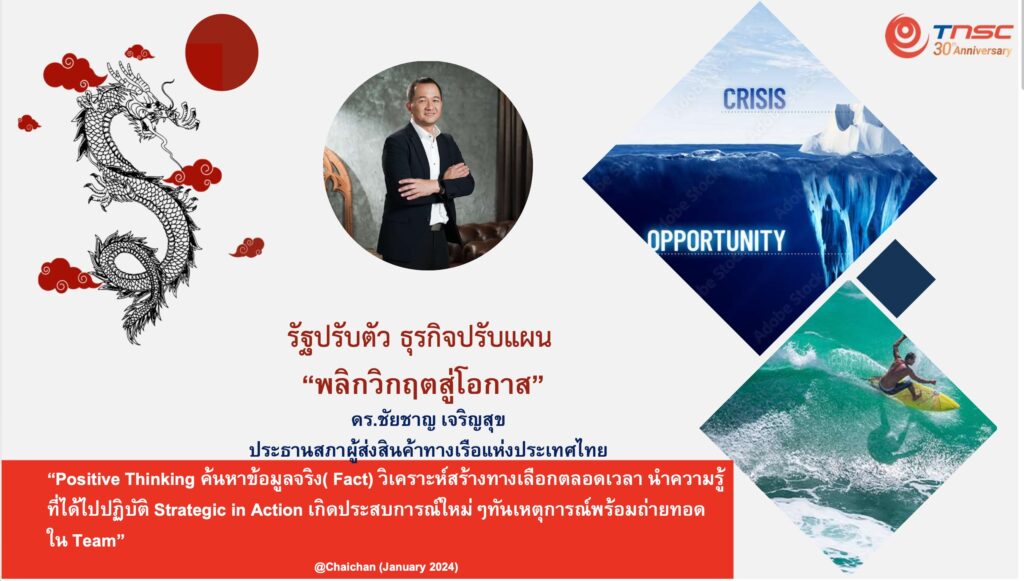
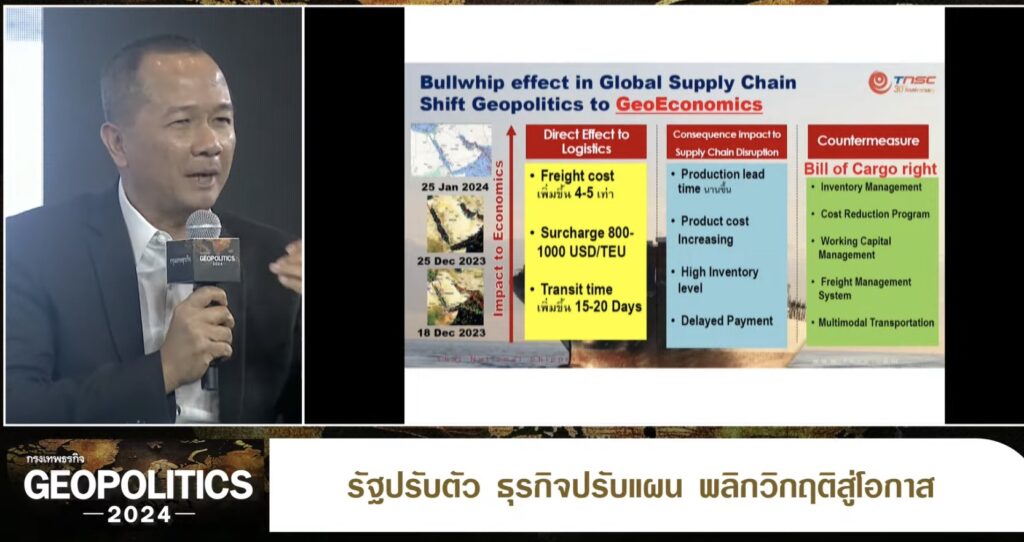
Dr Chainan saw many opportunities. For example, he said, China was one of the top manufacturers of Electric Vehicles. Just attracting more Chinese EV manufacturing here would create another 600,000 jobs. More Free Trade Agreements will mean more trade, and hence and more shipping. He also hailed the role of the land-bridge project.
Conclusions
Speakers pointed to a range of risks such as a possibility of another Donald Trump presidency, the growing US budget deficit, the conflict zones in Ukraine, the Middle East and the possibility of new ones across the China-Taiwan strait, the end of the pax-Americana and the string of elections coming up all through 2024. Against this background, the risks and threats exceed the opportunities. And even the opportunities can dissipate in a flash if the risks take a turn for the worse.
The elevation of geopolitics on the conference agenda is a welcome change from the monotonous boredom of “sustainability”. The inclusion of a UNHCR representative at a political/economic conference is also significant; business leaders, especially in Travel & Tourism need to get out of their comfort zones, hear a different perspective and emphathise more deeply with the human suffering caused by geopolitical conflicts.
But that is only scratching the surface. Still missing is any historical context to examine why the world has reached this stage in the first place, who should be held responsible and what lesssons can be learnt. Nor is there any discussion of early warning systems and preventive mechanisms to ward off the next crisis. Topics such as the obscene global military expenditure, the hegemenous influence of global corporations, the rich-poor income gap, the shift towards high-tech warfare, the rise of extremism and nationalism and the next looming health pandemic, amongst others, also need to be put on the table.
Keeping “Air Thailand” flying through this geopolitical turbulence will take some doing. Thailand, unlike China and India, does not have a sizeable domestic market to fall back on. In terms of tourism, trade, transportation and investment, it is heavily dependent on foreign factors, especially the connectivity with its ASEAN neighbours. Spreading these risks and reducing over-exposure to any of them will be critical. If one engine fails, “Air Thailand” can still remain in the air if the other three are ok.
An even riskier scenario is never mentioned: The political face-offs and threats facing the existing power structure within Thailand itself. A rising young generation is clamouring for change, seeking to reform the “higher institutions” and shake-up the long entrenched military establishment. This, against a background of ageing societies, labour shortages and the rising household debt problem.
Eventually, it will be all about the basics of preserving the peace. In its statement at the United Nations Security Council debate on the Israel-Palestine conflict on January 23, the Thai delegation made a passionate appeal for an enduring peace. That applies not just to the Middle East but globally, regionally and locally.
Sadly, an “enduring peace” does not seem to be anywhere in sight.



Liked this article? Share it!